There is no roadmap here, no development plan, only reflections on this experiment.
Written by: Dan Finlay, Co-founder of MetaMask
Translated by: angelilu, Foresight News
MetaMask co-founder Dan Finlay has launched two identically named meme coins, CONSENT, on Base and Solana. As of the time of writing, the market caps of the two tokens on Base and Solana are only $392,000 and $782,000, respectively. Although Solana has a slight lead, the market cap of the token was nearly $10 million at its peak yesterday, having since dropped by 90%. However, this developer has lost interest in continuing this game and wrote this report as a summary of the experiment. Below is the original text by Dan Finlay:
Out of curiosity, I conducted a "boring" experiment related to meme coins. On November 27, I created a token named CONSENT on Base and Solana through clanker and pump.fun, respectively. This was merely an experiment, and I had no further plans. This experiment left me feeling quite unpleasant, at least allowing me to experience the current meme coin ecosystem firsthand.
Where does the theme of the "CONSENT" token come from?
It all stems from a simple observation of social media dynamics. While browsing Twitter, Bluesky, and Farcaster, I noticed that the communities I follow have significant differences in how they treat informed consent regarding AI and data usage.
- Twitter/X: There seems to be the least concern about AI, with many AI researchers gathering on the platform. I have rarely seen discussions about the economic interests of artists (perhaps the artists have left, or maybe I just haven't noticed them).
- Farcaster: Composed of a group with Ethereum and Web3 backgrounds, they primarily focus on how to launch the next eye-catching product as quickly as possible, and it is easier to accuse those with ethical concerns of being "armchair critics," including criticism of meme coins.
- Bluesky: It seems to attract many artists I once followed, as well as many who care about the welfare of artists in the AI era. I completely understand this concern (I have been an artist for most of my life and once considered it as a career), but I find that these discussions lack the pragmatism I appreciate in the Farcaster subculture.

In particular, a post on Bluesky went viral, sharing a new Huggingface repository containing one million Bluesky posts for digital analysis and AI training. In the replies to this information, quite a few people expressed shock that the posts in the repository were shared without their consent.
One reply became the theme of my meme coin: How do you AI brothers not understand what "consent" is?
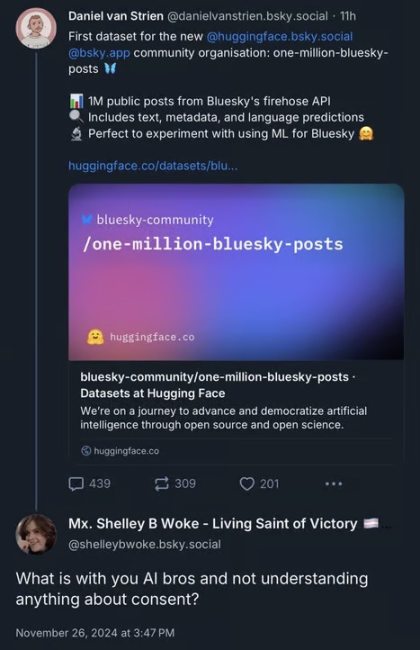
As a developer of the crypto wallet MetaMask, I have been contemplating the issue of informed consent for nearly a decade. Unfortunately, some of our current digital systems completely lack a clear informed consent mechanism. To be honest, even capturing a screenshot of this post without consent makes me feel a bit uncomfortable. However, from a protocol perspective, both Bluesky and Farcaster require all posts to be public and readable by anyone. While this is generally understood on Farcaster (due to its more technical user base), there is a disconnect on Bluesky between the protocol's requirement for informed consent and the social expectation of informed consent.
It turns out that P2P social media platforms are not the only digital protocols that have an unclear definition of informed consent at the social level, leading to some poor experiences. This situation also applies very well to meme coins.
My previous views on meme coins
My views on meme coins may differ from what the average reader expects.
Having experienced a unique token system in elementary school where teachers created tradable old toys, this experience deeply influenced my view of alternative currencies. I have always believed that alternative currencies have tremendous potential. Therefore, I pay special attention to token mechanisms that allow users to clearly express their levels of trust and reasons for trust.
However, the current operation model of meme coins seems to be an attempt to make some of the token mechanism concepts from the past few years easier to implement, such as replacing Reddit's voting mechanism with token weight, etc. But I still do not think this is a good approach.
First, I believe the primary value of tokens should be reflected in those that represent specific resources, rather than in "vague" meme coins that lack a clear vision (and are even difficult to develop into larger projects), where even the meme creators themselves are unclear about what they consented to.
Second, for projects that genuinely need funding, bonding curves may not be the best choice. When founding a new company, founders carefully consider when to issue new shares, to whom to sell them, and how to manage investor expectations. However, in a bonding curve, a token's positioning may fluctuate between "pure entertainment game" and "serious crowdfunding tool." On this platform, both parties in a transaction find it difficult to determine a specific position of a token on this spectrum. Moreover, it is strange that even when I created a meme that was very simple (even explicitly promising: "Holding this token allows you to use this text for AI training"), people still continuously tried to assign it more meaning.
To my knowledge, the current meme coin issuance platforms mainly provide token creators with the basic functions of buying and selling. Although they are equipped with public chat rooms and some metadata functions, the platform itself only offers the most basic trading capabilities. If we want to build a real community, achieve long-term development, and even raise funds for actual projects, why only provide these two simple functions? Pump.fun refers to token creators as "developers," while users refer to the developers' selling behavior as "rug behavior." This seems to stem from the fact that only software developers could issue tokens in the past, and… the only reason developers sell is to run away with investors' funds.
For me, it is deeply saddening to see a platform (which people call the main new use case of cryptocurrency) develop to this extent. It feels like the cynical sublimation of the worst behaviors in cryptocurrency over the past decade. Which is worse? Is it the developers who think that all people need is minting and rug pulls, or the users who seem to believe this is a way out of their economic situation?
Initially, the branding of this platform ("Fun!") led me to believe that there might be some interesting energy in this environment, but I should have known better. Recently, some people have taken extreme actions to "pump" their meme coins, including threatening to harm themselves and others (essentially trying to hold themselves or others hostage to coerce public traders).
I had hoped to see a community of traders: participants who are insightful and willing to invest a reasonable amount of tokens to enhance their capabilities, learning how to allocate new tokens within a truly trustworthy group. I hoped that when people held tokens from creators they appreciated, it would not be for the sake of quick profits or seeking larger exit opportunities, but because they believed that doing so could help build a long-term stable ecosystem together. This is the ideal situation I can imagine. I envisioned these participants realizing that they were actually playing a financial version of a high-five game. But the reality is quite different.
The experiment process
Earlier that day, someone suggested I use the clanker bot (an AI bot that mints tokens on demand) on Farcaster to convert a random meme into a token.
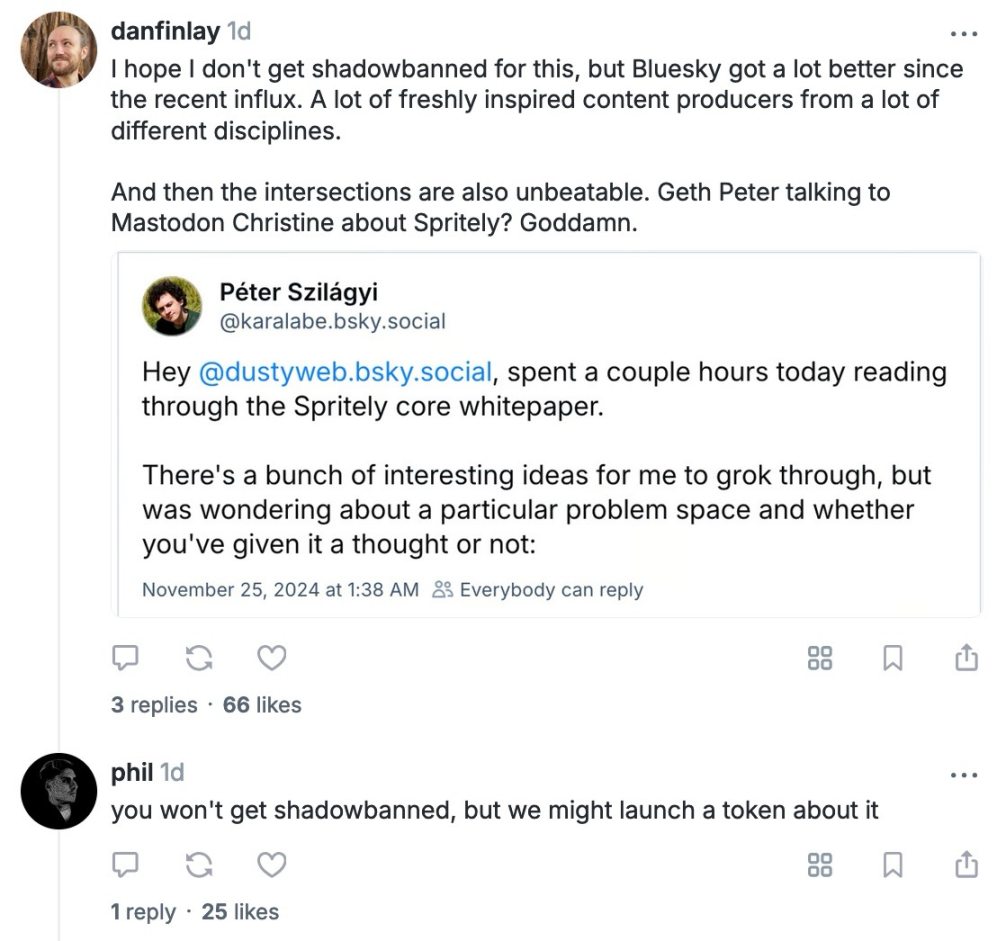
I chose that Bluesky post about data consent and access rights as the token name and created a token for it.
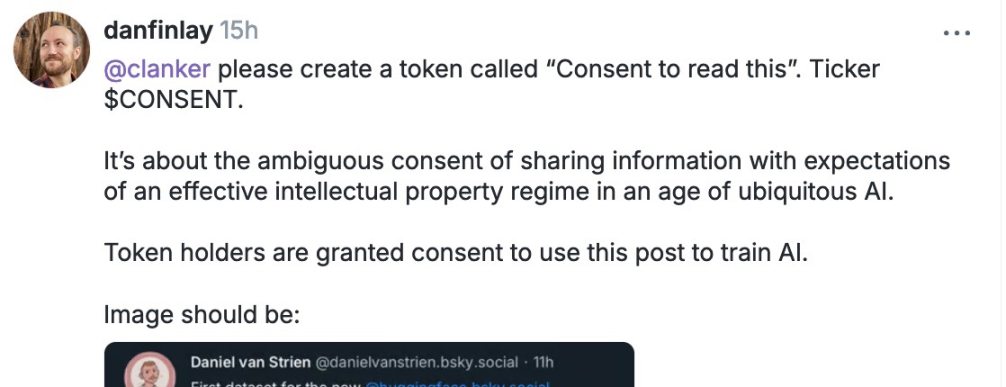
Launching a meme coin has never been so easy; you @ the bot and describe the meme, and then you see the token and a ticker, and now people can buy and sell that token. It immediately created a token, but I had no tokens, and I saw people rushing to buy them. I immediately felt a wave of anxiety. Would people sell off the tokens with my name on them, while I only focused on price fluctuations? So I quickly invested ETH into this token, so at least I would be close to the bottom price of the token.
With my frustrating experience on Clanker, I couldn't help but wonder if the model on pump.fun on Solana was the same. To conduct a product experiment, I had to try both.
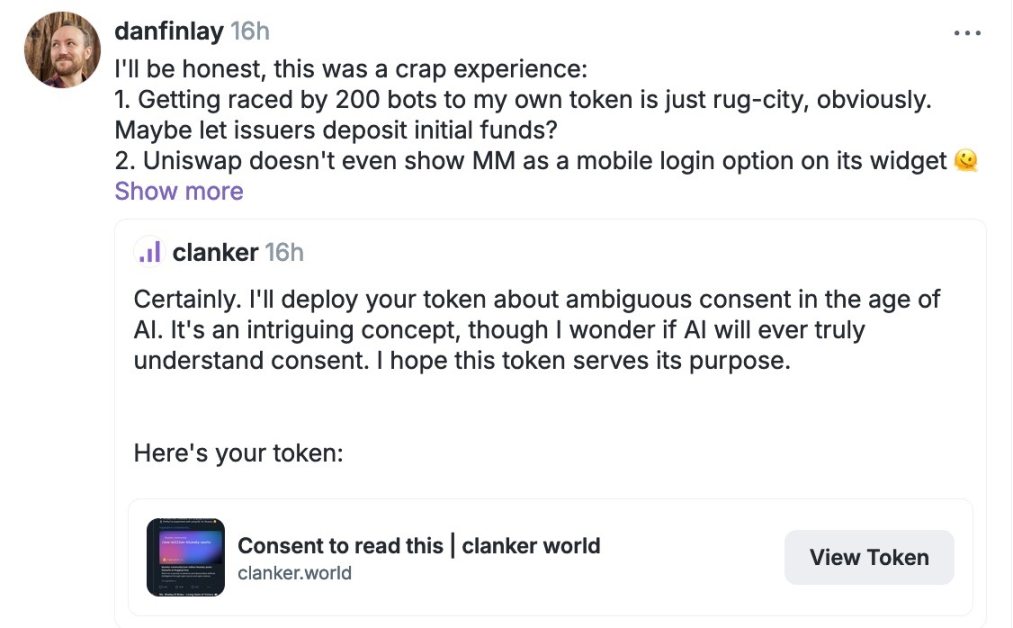
So I started to launch a token with the same name on Pump.fun.
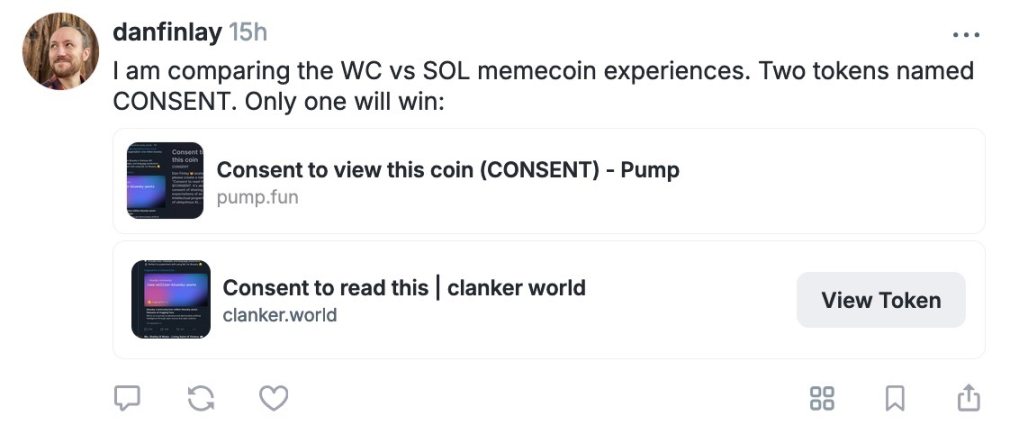
The ETH I invested in Clanker quickly halved, possibly due to early buyers selling off. While it looked bad, Clanker did allocate transaction fees to me with each trade, while continuously diluting market value. Although this mechanism "protected" me from early buyers running away, it actually imposed an invisible and ongoing siphoning on buyers. If your goal is to genuinely build a trustworthy treasury, you wouldn't want this feature (I am not sure if that is the goal).
In communication with the Clanker team, they shared some interesting project descriptions, development plans, and product ideas. They maintain an open attitude towards project iteration and strive to create value through exploration. This attitude is commendable, although I remain cautious about the long-term value of such tokens.
My experience on Solana was completely different. Although I only posted information about these two tokens on Farcaster, the response within the Solana ecosystem exceeded my expectations. I initially invested about 2 SOL (around $500) to launch the market, but within just one hour, the value of my holdings skyrocketed to over $100,000. When I tried to sell about 25% of my holdings (around $16,000), unexpectedly, the price rose instead of falling five minutes later, so I bought back at a higher price.
What truly worried me was that I found many retail investors pouring in unsettlingly large amounts of money. More buyers flooded in. The price began to rise. I started receiving a large number of private messages asking questions about the token. Some referred to me as the "developer" and inquired about the "roadmap."
The biggest problem is the inability to know the true identity of the buyers. In traditional financing, you wouldn't accept an investment from a friend who is addicted to gambling. But in bonding curve trading on public chains, the funds are just cold numbers entering and exiting, with no visibility into the counterparties. Interestingly, this ambiguity might make meme coins more "compliant" legally, but the actual risks could be greater. While sometimes ambiguity can be beneficial, especially when you trust the counterparty, in this open, first-come-first-served market, buyers cannot determine who is buying in at lower prices, so even trusting the project party does not guarantee safety.
In the meme coin environment, the only seemingly clear act of consent is that buyers explicitly agree to put money into something. But if there is no clear definition, what kind of consent is it?
As I write this article, I still feel troubled by these tokens. I have no idea who currently holds these tokens. Let me be clear: I have no plans to further develop these tokens. The purpose of issuing the tokens was as an educational experiment, and I hope that by sharing this information, I can spare others from conducting another "experiment."
The Paradox of CONSENT
This experience led me to an interesting paradox: if I want to create a token about informed consent (CONSENT), I need to carefully consider who can hold it. But in the current system, I cannot control who can purchase these tokens.
Worse yet, token holders may be completely unaware of what they own. They may not have read the token's description or commitments at all. In such cases, how can we ensure true informed consent?
This brings to mind some possible improvements:
- Creators should be able to restrict who can purchase their tokens. This may require some form of permission system.
- There needs to be a better way to ensure that buyers truly understand what they are purchasing. Perhaps they could be required to read and confirm certain information before buying.
- Token creators should have more tools to manage their tokens, not just simple buy and sell functions.
- Platforms should provide more options to set the uses and restrictions of tokens.
There should be better ways to build and maintain communities, rather than just focusing on price speculation. None of these are perfect solutions, but they may be steps in the right direction.
Thoughts for the Future
If we want meme coins to become meaningful tools rather than just speculative games, I think we need to seriously consider the following points:
- We need better tools to manage participants. Not everyone should be able to participate in every token project.
- We need clearer ways to express the purpose and commitments of tokens. This is not only to protect buyers but also to protect creators.
- We need to rethink terms like "developer" and "rug." These terms reflect an unhealthy mindset, suggesting that token creators are either building something or scamming.
- We need to consider how to ensure responsible participation while keeping it fun.
Conclusion
After this experiment, I have drawn the following conclusions:
- The current meme coin ecosystem is too chaotic for serious fundraising and too serious for casual entertainment. It is in an awkward middle ground.
- The lack of proper control and consent mechanisms makes this space rife with potential issues.
- Even the simplest, most straightforward tokens can be misunderstood and over-interpreted.
- We need to develop better tools and mechanisms to manage these interactions.
Perhaps most importantly, we need to seriously think about what we want this space to become. Is it purely entertainment? A serious fundraising tool? Or something in between?
In any case, the current state is far from ideal. I hope that by sharing these experiences and thoughts, I can foster some meaningful dialogue about how to make this space better, more responsible, and more meaningful.
To anyone holding any CONSENT tokens: Thank you for participating in this social experiment. I will leave my funds in these two places to address the accusations of my "deceptive behavior." If I could refund everything, I would, but I believe those who put tokens into this system did indeed consent.
免责声明:本文章仅代表作者个人观点,不代表本平台的立场和观点。本文章仅供信息分享,不构成对任何人的任何投资建议。用户与作者之间的任何争议,与本平台无关。如网页中刊载的文章或图片涉及侵权,请提供相关的权利证明和身份证明发送邮件到support@aicoin.com,本平台相关工作人员将会进行核查。



